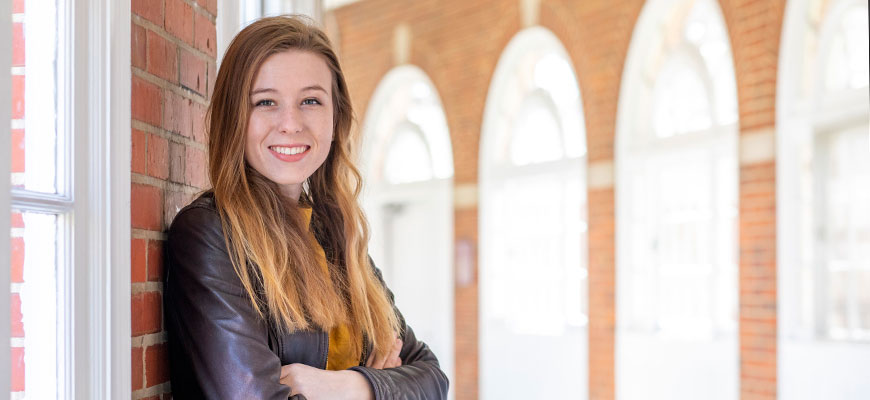
Fast track to MD
Honors College student takes accelerated pathway to medical school
Posted on: June 8, 2020; Updated on: June 8, 2020
By Megan Sexton, msexton@mailbox.sc.edu, 803-777-1421
Ashley Fellers has known she’s wanted to be a doctor since she was 12 years old, when she experienced a health scare while living with her family in Costa Rica.
Her parents had moved the family there after Fellers attended a Spanish language immersion school in Minnesota, seizing an opportunity to become fluent in another language and experience a new culture. And while her illness in that small fishing village turned out to be nothing serious, it left an impression that set her on the career path she is following today.
“Thankfully, I didn’t have Dengue fever. But my parents didn’t speak Spanish, so I was translating for them. I really enjoyed getting to know the doctors,” she says. “They were super compassionate trying to communicate through a 12-year-old.”
Fast forward a decade, and Fellers now is finishing her first year at the University of South Carolina School of Medicine Columbia . She is among the youngest members of the class, entering a year early through an accelerated pathway to medical school offered by the South Carolina Honors College known as the BARSC-MD.
Honors College freshmen have the chance to apply in the summer before their first semester at UofSC and interview for the program after their arrival on campus. A handful are chosen and offered conditional acceptance to the School of Medicine Columbia — without having to stress about med school applications or take the Medical College Admissions Test. The BARSC-MD students are required to take more honors and sciences classes than other Honors College students, and they must conduct research, participate in community service, be proficient in a foreign language and complete a nine-hour senior thesis. The program puts them on track to earn an undergraduate and medical degree in seven years.
“It serves students who already are feeling a solid commitment to a medical career by their senior year of high school. They absolutely know this is what they want to do, and they prefer to get through their undergraduate training more quickly and right into medical school,” says Dr. Anita Hood, physician and founding coordinator of the BARSC-MD program. “It serves a necessary niche, as there are a number of students who fit that profile. They would rather spend more of their time in health care and eventually in the practice of medicine.”
The idea of knowing where I was going, being able to know the program before I arrived, and having a support group and friends was really important to me.
Ashley Fellers, first-year student at UofSC School of Medicine
Fellers graduated from Lexington High School and arrived at UofSC as a Stamps Scholar, one of the university’s most selective and generous scholarship programs. As a Stamps Scholar, she had opportunities to study abroad and conduct research, both of which were important to her. Fellers got involved quickly, doing undergraduate research in environmental health and pediatric cancer.
“Freshman year, I knew I wanted to get involved in research, and I saw a profile online of Tim Mousseau,” a professor of biological sciences who has conducted extensive research on Chernobyl and the effects of radioactive contaminants, she says. “I went to his office and told him I wanted to do research. He said, ‘OK, let’s get started.’ ”
For her senior thesis, Fellers drew on her work with Mousseau and Magdalena Stawkowski, an assistant professor who specializes in cultural and medical anthropology. Fellers’ research looked at pediatric cancers in areas with higher rates of radioactive contamination.
While Honors College students must complete a 3-credit senior thesis on a variety of topics, the BARSC-MD student requirements include a 9-credit senior thesis, focusing on a health, medical or scientific topic. “We have a strong emphasis on research for these students that will ease their path in medical school and residency,” Hood says.
Fellers packed a lot into her three years as an undergraduate on campus. Along with research, she spent a summer in Peru on a service learning trip and spent a semester in Spain studying health sciences, including an internship in an oncology ward and a class on stem cell research. Still, as part of the BARSC-MD program, she completed the necessary 69 hours in Honors College courses to graduate early.
Now, she’s at the UofSC School of Medicine Columbia, in a first-year class with five other BARSC-MD students who started at the Honors College with her. "Her group, the BARSC-MD group in the year ahead, and several other Honors College graduates at the School of Medicine are serving as valuable peer mentors to the current undergraduate participants. And from Day One of the program, especially with the heat of competition for a medical seat turned off, all groups are encouraged to support and develop lasting connections with each other while pursuing their common goal," Hood says.
“Med school is hard, I’m going to be honest. It’s a big transition. I think whether you have three years (of undergrad) or 10 years, it’s going to be a tough transition,” she says. “But I knew this was a good program for me. This was a medical school I toured when I was in high school. This is where they took the pre-health sciences students. The idea of knowing where I was going, being able to know the program before I arrived, and having a support group and friends was really important to me.”
Share this Story! Let friends in your social network know what you are reading about